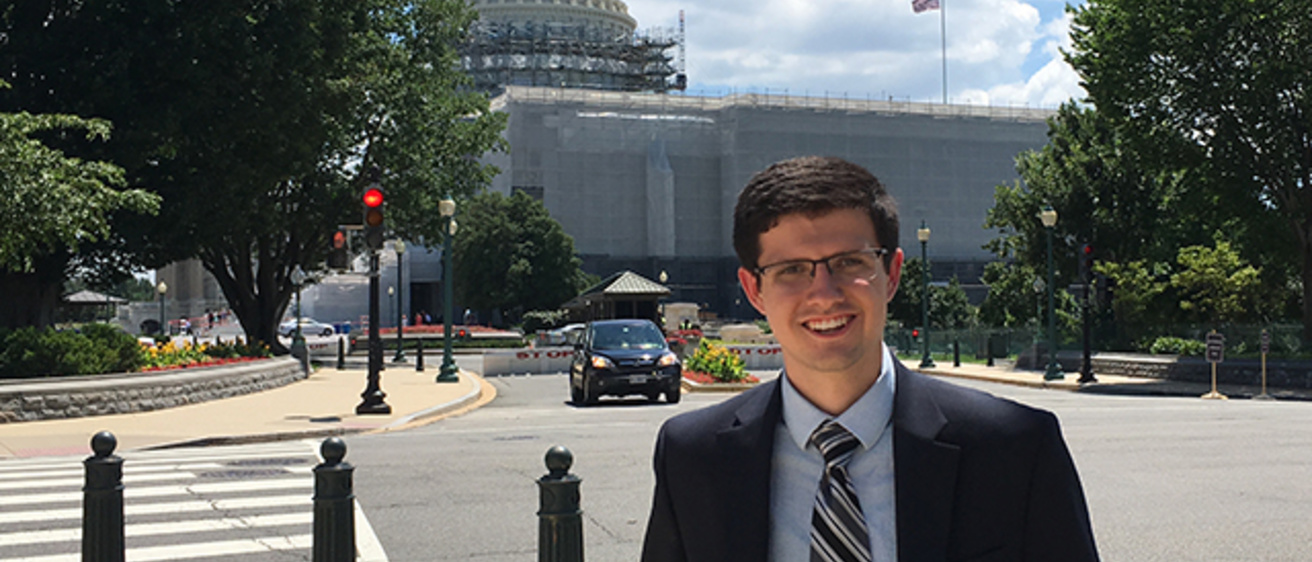It’s never too early to think about an internship. That’s what Daniel Larkin thought, and he got to spend six weeks in Washington, D.C., this summer working with the staff of U.S. Sen. Joni Ernst, R-Iowa.
“I learned so much as an intern that you can’t learn in a classroom or on campus,” says Larkin, a University of Iowa political science major from Ottumwa who’s keeping his career options open but is thinking about law school and work as a federal investigator. “I interacted with constituents and worked on their concerns. I saw how government operates, and I improved my communication skills. It was a great experience.”
Larkin is a rarity at the UI; few first-year students participate in internships. Of the 2,500 internships on the Pomerantz Career Center’s HireaHawk.com online job and internship listings site, only a handful would be suitable for a student so early in their academic career.
Jenny Noyce, associate director of experiential education in the Pomerantz Center, says only about five percent of UI students who have internships registered with the career center during the year are first-year students. Given all the disruption in the lives of students so new to the university experience, she says that’s not surprising.
Hundreds of employers will be on hand at the annual fall career and internship fairs in September and October, providing UI students with the opportunity to learn about full-time employment and internships with those organizations.
The fairs, organized by the Pomerantz Career Center and Engineering Professional Development Office, will be held in the Iowa Memorial Union.
The all-major career fair, which will also include booths from the university’s graduate programs, will take place from 11 a.m. to 4 p.m. on Thursday, Sept. 22.
The actuarial science, insurance, and risk management fair will run from 1 to 4 p.m. on Wednesday, Sept. 28.
The engineering fair will be from noon to 5 p.m. on Thursday, Oct. 6.
“Some students are still going to be adjusting to college life and all the challenges that come with that, so they may not be ready for an internship,” Noyce says. “But other students are ready to go to the next level.”
For those who are, Noyce says career advisers encourage them to consider an internship at any time. First-year internships, like internships later in a college career, give students the chance to build both their professional skills and an impressive resume that likely will lead to better internships later on.
At the same time, an internship might be an eye-opening experience that prompts a student to reconsider their chosen major.
“A first-year internship gives the students a chance to realize that this might not be what they want to do after all, and they still have time to pivot and make new plans,” she says.
Noyce says the Pomerantz Career Center works with students of any age to help them find an internship, but because so few employers are looking for interns who have only one year of college experience, most first-year students find internships through their personal networks. That was true for Larkin, who applied on a whim when he saw the application on Ernst’s website. A round of interviews later, and he was headed east.
Larkin interned from May 23 to July 8, living in a dorm at George Washington University and working in Ernst’s office in the Russell Senate Office Building, just across the street from the U.S. Capitol. While the D.C. joke is that interns mostly run the copy machine and pick up coffee for the staff, Larkin says they actually have opportunities to gain on-the-job experience. He gave tours of the U.S. Capitol and worked with Iowans who contacted Ernst’s office because they had a problem that needed fixing or an opinion that needed airing. He says that constituents who contact the office are taken seriously and their comments receive a reply.
“We read everything that’s sent to us, and pretty much everyone gets a response,” he says.
Constituent service work also was helpful life preparation because “if you can talk with an angry constituent on the phone, you can handle most anything.”
He and the other interns spent a day shadowing Ernst, and he occasionally attended policy briefings and reported back to staff members.
The most important thing he learned, he says, is that the federal government is filled with hard-working people on both sides of the political aisle who have the nation’s best interests at heart, despite what the stereotype might be.
“People think the gridlock is worse than it is,” says Larkin. “So many times, I saw Democrats and Republicans talking to each other and working together to get things done. The political divide is real, but it’s not as dramatic as Americans think it is.”
After seven weeks—he stayed an extra week to see parts of the capitol he hadn’t managed to visit yet—Larkin says he looked forward to returning to Iowa, if for no other reason than a good night’s sleep. His room at George Washington University was across the street from a D.C. fire station, so he awoke several times a night to blaring sirens and honking horns.
“You learn to sleep through it, but not always,” he says. “That first night I was home, I was asleep before my head hit the pillow.”
